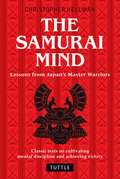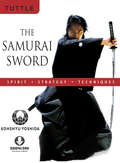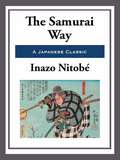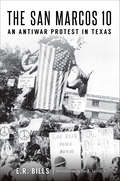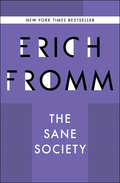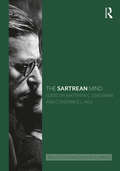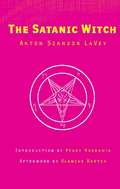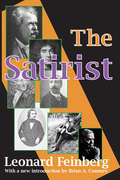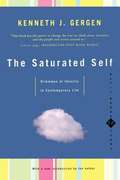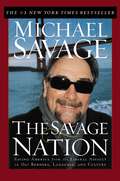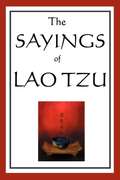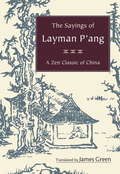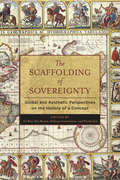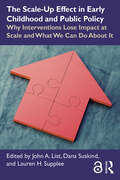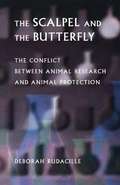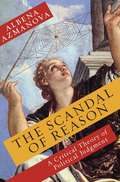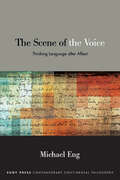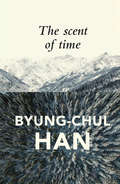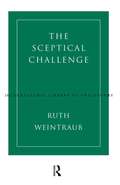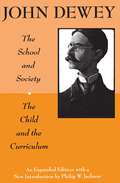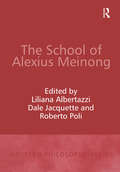- Table View
- List View
The Samurai Mind
by Christopher HellmanThe Samurai Mind is a collection of five seminal Japanese texts which together convey the very essence of the traditional samurai warrior ethos. These texts range from the ferocious to the esoteric--with their common thread being the importance of mastering one's own mind as the key to overcoming opponents. Written from the mid-18th to early 19th century, the authors were acknowledged master warriors keen to address a broader audience beyond their circle of students and acolytes. Their aim was to explain their craft to the outside world, and they do so with great insight.
The Samurai Sword: Spirit * Strategy * Techniques
by Kohshyu YoshidaThe Samurai Sword is an indispensable guide to theory and practice that respects both the physical and spiritual aspects of martial arts practice with the samurai sword. Featuring guidance for selecting, maintaining and using your sword, it also delves into the practical value of meditation and provides brief, inspirational biographies of some of the greatest samurai, men whose words and deeds embodied the true spirit of the samurai warrior.Written by a descendant of samurai warriors, The Samurai Sword provides both a strong, hands-on foundation for beginners and advice for the practiced swordsperson.
The Samurai Sword: Spirit * Strategy * Techniques
by Kohshyu YoshidaThe Samurai Sword is an indispensable guide to theory and practice that respects both the physical and spiritual aspects of martial arts practice with the samurai sword. Featuring guidance for selecting, maintaining and using your sword, it also delves into the practical value of meditation and provides brief, inspirational biographies of some of the greatest samurai, men whose words and deeds embodied the true spirit of the samurai warrior.Written by a descendant of samurai warriors, The Samurai Sword provides both a strong, hands-on foundation for beginners and advice for the practiced swordsperson.
The Samurai Way
by Inazo NitobeCollected here in one edition are two of the most important books on the Samurai Way, Bushido: The Soul of Japan and The Book of Five Rings. Bushido: Chivalry is a flower no less indigenous to the soil of Japan than its emblem, the cherry blossom; nor is it a dried-up specimen of an antique virtue preserved in the herbarium of our history. It is still a living object of power and beauty among us. The Book of Five Rings: There are various Ways. There is the Way of salvation by the law of Buddha, the Way of Confucius governing the Way of learning, the Way of healing as a doctor, as a poet teaching the Way of Waka, tea, archery, and many arts and skills. Generally speaking, the Way of the warrior is resolute acceptance of death.
The San Marcos 10: An Antiwar Protest in Texas
by E.R. BillsOn November 13, 1969, ten students at Texas State University were suspended for participating in a peaceful protest against the Vietnam War. They had kept vigil in front of the Huntington Mustangs, bearing signs that read,"Vietnam Is an Edsel" and "44,000 U.S. Dead, For What?" while an increasingly hostile anti-protest crowd chanted, "Love it or leave it!" and "Let's string 'em up!" It was a day after news of the My Lai massacre broke. Part of a coordinated, nationwide Vietnam Moratorium effort that confounded and infuriated the Nixon White House, the "San Marcos 10" challenged their suspension, taking their case all the way to the United States Supreme Court. Author E.R. Bills offers this fascinating glimpse into the 1960s antiwar movement in Texas, the extraordinary measures to quell it and the broader social activism in which it participated.
The Sane Society (Psicologia Y Psicoan Ser.)
by Erich FrommA New York Times bestseller about overcoming the profound ills of modern society by a legendary social psychologist, the author of Escape from Freedom. One of Fromm&’s main interests was to analyze social systems and their impact on the mental health of the individual. In this study, he reaches further and asks: &“Can a society be sick?&” He finds that it can, arguing that Western culture is immersed in a &“pathology of normalcy&” that affects the mental health of individuals. In The Sane Society, Fromm examines the alienating effects of modern capitalism, and discusses historical and contemporary alternatives, particularly communitarian systems. Finally, he presents new ideas for a re-organization of economics, politics, and culture that would support the individual&’s mental health and our profound human needs for love and freedom. This ebook features an illustrated biography of Erich Fromm including rare images and never-before-seen documents from the author&’s estate.
The Sartrean Mind (Routledge Philosophical Minds)
by Matthew C. Eshleman Constance L. MuiJean-Paul Sartre was one of the most important philosophers of the twentieth century. His influence extends beyond academic philosophy to areas as diverse as anti-colonial movements, youth culture, literary criticism, and artistic developments around the world. Beginning with an introduction and biography of Jean-Paul Sartre by Matthew C. Eshleman, 42 chapters by a team of international contributors cover all the major aspects of Sartre’s thought in the following key areas: Sartre’s philosophical and historical context Sartre and phenomenology Sartre, existentialism, and ontology Sartre and ethics Sartre and political theory Aesthetics, literature, and biography Sartre’s engagements with other thinkers. The Sartrean Mind is the most comprehensive collection on Sartre published to date. It is essential reading for students and researchers in philosophy, as well as for those in related disciplines where Sartre’s work has continuing importance, such as literature, French studies, and politics.
The Satanic Witch
by Anton Szandor LaveyThe late Anton Szandor LaVey, founder of the Church of Satan, may be the most notoriously familiar for his Satanic Bible, but The Satanic Witch best reflects the discoveries Anton made in his younger days working the carny shows and Mitt Camps. This is undiluted Gypsy lore regarding the forbidden knowledge of seduction and manipulation. The Satanic Witch is not designed for Barbie Dolls, but women cunning and crafty enough to employ the workable formulas within, which instantly surpass the entire catalogue of self-help tomes and New Age idiocies. The Introduction -- Peggy Nadramia, High Priestess of the Church of Satan, tells us how this book changed her life. The Afterword -- Blanche Barton, Anton LaVey’s biographer, Chairmistress of the Council of Nine, and mother of Satan Xerxes Carnacki LaVey, Anton’s third child, informs us how The Satanic Witch came to pass and influence the behavior of so many women.
The Satir Process: Practical Skills for Therapists
by Sharon LoeschenFamily psychotherapy based on the philosophy of Virginia Satir.
The Satirist: His Temperament, Motivation, And Influence
by Theodore DraperSatire takes as its subject the absurdity of human beings, their societies, and the institutions they create. For centuries, satirists themselves, scholars, critics, and psychologists have speculated about the satirist's reasons for writing, temperament, and place in society. The conclusions they have reached are sometimes contradictory, sometimes complementary, sometimes outlandish. In this volume, Leonard Feinberg brings together the major theories about the satirist, to provide in one book a summary of the problems that specialists have examined intensively in numerous books and articles.In part 1, Feinberg examines the major theories about the motivation of the satirist, and then proposes that "adjustment" comes most closely to answering this question. In his view, the satirist resolves his ambivalent relation to society through a playfully critical distortion of the familiar. The personality of the satirist, the apparently paradoxical elements of his nature, the problem of why so many great humorists are sad men, and the contributions of psychoanalysts are explored in part 2, where Feinberg contends that the satirist is not as abnormal as he has sometimes been made to seem, and that if he is a neurotic he shares traits of emotional or social alienation with many others. Part 3 explores the beliefs of satirists and their relation to the environment within which they function, particularly in the contexts of politics, religion, and philosophy. Feinberg stresses the ubiquity of the satirist and suggests that there are a great many people with satiric temperaments who fail to attain literary expression.Ranging with astonishing breadth, both historical and geographical, The Satirist serves as both an introduction to the subject and an essential volume for scholars. Brian A. Connery's introduction provides an overview of Feinberg's career and situates the volume in the intellectual currents in which it was written.
The Saturated Self: Dilemmas Of Identity In Contemporary Life
by Kenneth J. GergenToday's ever-expanding communications technologies force us to relate to more people and institutions than ever before, challenging the way we view ourselves and our relationships. This powerful and provocative book draws from a wide range of disciplines--from anthropology to psychoanalysis, from film and fiction to literary theory--to explore these profound changes in our understanding of self-identity and their implications for cultural and intellectual life.
The Savage Nation: Saving America from the Liberal Assault on Our Borders, Language and Culture
by Michael SavageMichael Savage attacks big government and liberal media bias. The son of immigrants, Savage shows how traditional American freedoms are being destroyed from the outside and undermined from within-not just our own government, but also from alien forces within our own society. Savage argues that if the price of liberty is eternal vigilance, then only a more "savage nation" will enjoy these liberties. Savage's high ratings and the rapid growth of his program prove he is in touch with the concerns of the average American.
The Sayings of Lao Tzu
by Lao TzuThe Tao, which can be expressed in words, is not the eternal Tao; the name which can be uttered is not its eternal name. Without a name, it is the Beginning of Heaven and Earth; with a name, it is the Mother of all things. Only one who is eternally free from earthly passions can apprehend its spiritual essence; he who is ever clogged by passions can see no more than its outer form. These two things, the spiritual and the material, though we call them by different names, in their origin are one and the same. This sameness is a mystery-- the mystery of mysteries. It is the gate of all spirituality.
The Sayings of Layman P'ang: A Zen Classic of China
by James GreenThese wise and funny stories have been an inspiration to spiritual practice for more than twelve centuries, particularly for all those who follow the Buddhist path as laypeople. Layman P'ang (740-808) was a merchant and family man who one day put all his money and possessions in a boat and sunk it in a river, so that he could devote his life to the study of the dharma. His wife, son, and daughter joined him enthusiastically on his new path, taking up a joyfully itinerant life together as they traveled from temple to monastery across southern China. This collection of anecdotes and verses about the enlightened layman and his family has become an enduring Zen classic.
The Scaffolding of Sovereignty: Global and Aesthetic Perspectives on the History of a Concept (Columbia Studies in Political Thought / Political History)
by Stefanos Geroulanos Zvi Ben-Dor Benite Nicole JerrWhat is sovereignty? Often taken for granted or seen as the ideology of European states vying for supremacy and conquest, the concept of sovereignty remains underexamined both in the history of its practices and in its aesthetic and intellectual underpinnings. Using global intellectual history as a bridge between approaches, periods, and areas, The Scaffolding of Sovereignty deploys a comparative and theoretically rich conception of sovereignty to reconsider the different schemes on which it has been based or renewed, the public stages on which it is erected or destroyed, and the images and ideas on which it rests.The essays in The Scaffolding of Sovereignty reveal that sovereignty has always been supported, complemented, and enforced by a complex aesthetic and intellectual scaffolding. This collection takes a multidisciplinary approach to investigating the concept on a global scale, ranging from an account of a Manchu emperor building a mosque to a discussion of the continuing power of Lenin’s corpse, from an analysis of the death of kings in classical Greek tragedy to an exploration of the imagery of “the people” in the Age of Revolutions. Across seventeen chapters that closely study specific historical regimes and conflicts, the book’s contributors examine intersections of authority, power, theatricality, science and medicine, jurisdiction, rulership, human rights, scholarship, religious and popular ideas, and international legal thought that support or undermine different instances of sovereign power and its representations.
The Scale-Up Effect in Early Childhood and Public Policy: Why Interventions Lose Impact at Scale and What We Can Do About It
by John A. ListThis critical volume combines theoretical and empirical work across disciplines to explore what threatens scalability—and what enables it—in the early childhood field. Authors and editors provide specific recommendations to help professionals refine and apply the science of scaling in their programs, research, and decision making.Written by leading experts in early childhood, economics, psychology, public health, philanthropy, and more, chapters and commentaries shine light on how to effectively use experimental insights for policy purposes. The result is a comprehensive and forward-thinking guide to the challenges and possibilities of effective scaling in early childhood and beyond.Essential reading for researchers, practitioners, funders, and policy makers alike, this book raises vital questions and provides a vision for the long-term journey to scalable evidence.
The Scalpel and the Butterfly - The Conflict Between Animal Research and Animal Protection
by Deborah RudacilleIn this sweeping history of animal research and the animal protection movement, Deborah Rudacille examines the ethical question of whether enhancement of human life justifies the use of animals for research. She shows how the question and the answers provided by both scientists and anti-vivisectionists over the past 150 years have shaped contemporary society. Rudacille anchors her narrative in events from the lives of key players in the history of the war between science and animal protection, describing the work of activists who work outside the law as well as those working to change the system from within.
The Scandal of Reason: A Critical Theory of Political Judgment (New Directions in Critical Theory #47)
by Albena AzmanovaTheories of justice are haunted by a paradox: the more ambitious the theory of justice, the less applicable and useful the model is to political practice; yet the more politically realistic the theory, the weaker its moral ambition, rendering it unsound and equally useless. Brokering a resolution to this "judgment paradox," Albena Azmanova advances a "critical consensus model" of judgment that serves the normative ideals of a just society without the help of ideal theory. Tracing the evolution of two major traditions in political philosophy—critical theory and philosophical liberalism—and the way they confront the judgment paradox, Azmanova critiques prevailing models of deliberative democracy and their preference for ideal theory over political applicability. Instead, she replaces the reliance on normative models of democracy with an account of the dynamics of reasoned judgment produced in democratic practices of open dialogues. Combining Hannah Arendt's study of judgment with Pierre Bourdieu's social critique of power relations, and incorporating elements of political epistemology from Kant, Wittgenstein, H. L. A. Hart, Max Weber, and American philosophical pragmatism, Azmanova centers her inquiry on the way participants in moral conflicts attribute meaning to their grievances of injustice. She then demonstrates the emancipatory potential of the model of critical deliberative judgment she forges and its capacity to guide policy making. This model's critical force yields from its capacity to disclose the common structural sources of injustice behind conflicting claims to justice. Moving beyond the conflict between universalist and pluralist positions, Azmanova grounds the question of "what is justice?" in the empirical reality of "who suffers?" in order to discern attainable possibilities for a less unjust world.
The Scene of the Voice: Thinking Language after Affect (SUNY series in Contemporary Continental Philosophy)
by Michael EngThe recent turns to affect and aesthetics in the humanities and the interpretive social sciences have been productive for reflecting on the crucial role sensibility plays in the constitution of the social. However, these scholarly developments construct their interventions by dismissing the attention to language that was central to the linguistic and cultural turns of previous eras and by claiming that language is an obstacle to experiencing the reality of difference to which they maintain only sensibility can grant access. By analyzing the figure of the voice in the work of Martin Heidegger and the continental thinkers who follow him, The Scene of the Voice shows that the dismissal of language in favor of sensibility requires overlooking their common connection in the problem of mimesis. As this book ultimately argues, artificially separating language and sensibility results in a failure to encounter affect, the relation to difference affect is said to name, and the experience of thinking affect is taken to provoke.
The Scent of Time: A Philosophical Essay on the Art of Lingering
by Byung-Chul HanIn his philosophical reflections on the art of lingering, acclaimed cultural theorist Byung-Chul Han argues that the value we attach today to the vita activa is producing a crisis in our sense of time. Our attachment to the vita activa creates an imperative to work which degrades the human being into a labouring animal, an animal laborans. At the same time, the hyperactivity which characterizes our daily routines robs human beings of the capacity to linger and the faculty of contemplation. It therefore becomes impossible to experience time as fulfilling. Drawing on a range of thinkers including Heidegger, Nietzsche and Arendt, Han argues that we can overcome this temporal crisis only by revitalizing the vita contemplativa and relearning the art of lingering. For what distinguishes humans from other animals is the capacity for reflection and contemplation, and when life regains this capacity, this art of lingering, it gains in time and space, in duration and vastness.
The Sceptical Challenge (International Library of Philosophy)
by Ruth WeintraubDo we really know the things we think we know? Are any of our beliefs reasonable? Scepticism gives a pessimistic reply to these important epistemological questions - we don't know anything; none of our beliefs are reasonable. But can such a seemingly paradoxical claim be more than an intellectual curiousity? And if it is, can it be refuted? Ruth Weintraub answers yes to both these questions. The sceptical challenge is a formidable one, and should be confronted, not dismissed. The theoretical and practical difficulties it presents - in that the sceptical life cannot be lived, and the doctrine seems self-defeating - are in fact superficial, according to Ruth Weintraub. Her study looks at the sceptical arguments of Descartes, Hume and the ancient Greek sceptic, Sextus Empiricus. The author argues that by drawing on philosophy, rather than science, the sceptical challenge can be answered. The Sceptical Challenge is a bold and original response to scepticism; it represents a new way of looking at the field for philosophers of epistemology.
The School I'd Like: Children and Young People's Reflections on an Education for the 21st Century
by Catherine Burke Ian Grosvenor‘Wonderfully illuminated by children's essays, stories, poems, pictures and plans, this ground-breaking book offers a unique snapshot of the perceptions of today's school pupils’. -French bookstore Lavoisier www.lavoisier.fr In 2001, The Guardian launched a ground-breaking competition called ‘The School I'd Like’, in which young people were asked to imagine their ideal school. This vibrant and compelling book presents material drawn from that competition, offering a unique snapshot of perceptions of schools by those who matter most - the pupils. In 2011, The Guardian re-launched the competition and this updated 2nd edition reflects upon the next generation of reflections and summarises, through the children’s insightful commentary, what has changed over the intervening decade. The book is wonderfully illustrated by children's essays, stories, poems, pictures and plans. Placing their views in the centre of the debate, it provides an evaluation of the democratic processes involved in teaching and learning by: • identifying consistencies in children's expressions of how they wish to learn • highlighting particular sites of 'disease' in the education system today • illustrating how the built environment is experienced by today's children • posing questions about the reconstruction of teaching and learning for the twenty-first century. The School I’d Like: Revisited offers a powerful perspective on school reform and is essential reading for all those involved in education and childhood studies, including teachers, advisors, policy-makers, academics, and anyone who believes that children's voices should not be ignored.
The School and Society, and The Child and the Curriculum
by John DeweyAmerica's arch-philosopher of education wrote these two short pieces out of his experience with Chicago's laboratory school which he started in 1896. Dewey's first piece (1915) argues for making the school into a microsociety of the larger one, while in the second (1902) he seeks a curriculum acting as a kind of program for teachers to follow. Teachers can then guide children toward enough self-confidence to be assertive and exercise their capacities. Cited in Books for College Libraries, 3rd ed. Annotation c. Book News, Inc., Portland, OR (booknews.com)
The School of Alexius Meinong (Western Philosophy Series)
by Dale Jacquette Liliana AlbertazziThis book presents an historical and conceptual reconstruction of the theories developed by Meinong and a group of philosophers and experimental psychologists in Graz at the turn of the 19th century. Adhering closely to original texts, the contributors explore Meinong's roots in the school of Brentano, complex theories such as the theory of intentional reference and direct reference, and ways of developing philosophy which are closely bound up with the sciences, particularly psychology. Providing a faithful reconstruction of both Meinong's contributions to science and the school that arose from his thought, this book shows how the theories of the Graz school raise the possibility of engaging in the scientific metaphysics and ontology that for so long have been considered off limits.
The School of History: Athens in the Age of Socrates
by Mark H. MunnHistory, political philosophy, and constitutional law were born in Athens in the space of a single generation--the generation that lived through the Peloponnesian War (431-404 b.c.e.). This remarkable age produced such luminaries as Socrates, Herodotus, Thucydides, Sophocles, Euripides, Aristophanes, and the sophists, and set the stage for the education and early careers of Plato and Xenophon, among others. The School of History provides the fullest and most detailed intellectual and political history available of Athens during the late fifth century b.c.e., as it examines the background, the context, and the decisive events shaping this society in the throes of war. This expansive, readable narrative ultimately leads to a new understanding of Athenian democratic culture, showing why and how it yielded such extraordinary intellectual productivity. As both a source and a subject, Thucydides' history of the Peloponnesian War is the central text around which the narrative and thematic issues of the book revolve. Munn re-evaluates the formation of the Greek historiographical tradition itself as he identifies the conditions that prompted Thucydides to write--specifically the historian's desire to guide the Athenian democracy as it struggled to comprehend its future. The School of History fully encompasses recent scholarship in history, literature, and archaeology. Munn's impressive mastery of the huge number of sources and publications informs his substantial contributions to our understanding of this democracy transformed by war. Immersing us fully in the intellectual foment of Athenian society, The School of History traces the history of Athens at the peak of its influence, both as a political and military power in its own time and as a source of intellectual inspiration for the centuries to come.A Main Selection of the History Book Club
